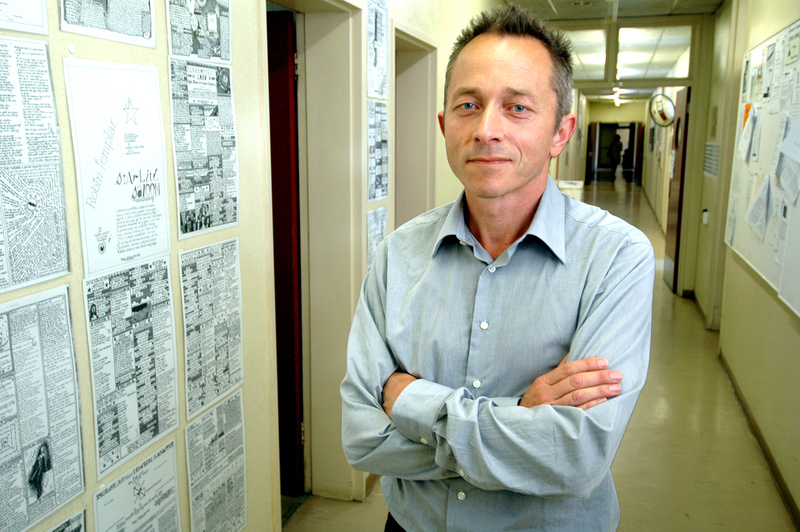New frontiers: Chemistry, the brain and behaviour
02 April 2013
A world leader and pioneer in the multidisciplinary field of hormones, the brain and human social-emotional behaviour, Professor Jack van Honk is UCT's newest A-rated scholar. Almost 15 years ago he became the world's first researcher to use both hormonal manipulation and brain stimulation techniques to gain direct insight into the psychobiological mechanisms underlying human social-emotional behaviour.
The announcement of Van Honk's A-rating follows the National Research Foundation's latest announcement for the 2012 cycle (see story p1). An honorary professor in the Department of Psychiatry and Mental Health since 2010, Van Honk first came to work at UCT in 2008, and now spends ten months of each year here and two months teaching at his alma mater, Utrecht University, in social and affective neuroscience. He is the department's second A-rated scholar. Head of department Professor Dan Stein was first awarded an A-rating in 2008. Netherlands-born Van Honk leads several UCT research projects, funded by entities in South Africa, Holland and the US. His fields of specialisation are psychoneuroendocrinology, affective neuroscience and neuropsychology, on which he's published prolifically, with 75 research and theoretical papers in peer-reviewed journals in the past eight years alone.
This research has been funded by research grants from Utrecht University, the Netherlands Society of Scientific Research and the US Hope for Depression Research Foundation. It underpins the development of innovative treatment strategies, such as hormone manipulation and transcranial magnetic stimulation, to treat fear and aggression disorders like psychopathy, impulsive aggression, psychological trauma and human phobia. In many ways, Van Honk's core field of research, social neuroscience, has followed the trend predicted for science by Pulitzer Prize-winning scientist and author Edward Wilson in his visionary book, Consilience: The unity of knowledge. Here Wilson explores a unified theory of knowledge that spans disciplines from physics and biology to the social sciences and humanity.
"Social neuroscience," according to Van Honk, "provides an excellent foundation for the creation of a so-called common body of knowledge, as it combines techniques and insights gained from psychology, sociology, neuroscience, biology and economics." "My personal interest in this fascinating realm is not only to gain fundamental understandings of the psychology of human social behaviour, but also to understand and seek innovative treatments for the psychopathologies of fear and aggression." His interest in human emotion was piqued 16 years ago as a PhD student at Utrecht. He was among the first researchers to introduce multiple biological measures to research human emotion.
"By the end of the 20th century the biological approach to human emotion had received enormous impetus - and I profited, with many publications and prestigious research grants for innovative research in the areas of social and affective neuroscience." Over the years he's used a broad set of measures and techniques from the social, biological and neuroscience fields, ranging from simple reaction-time tasks to magnetic resonance imaging.
Although methodologically broad, his research through the years has been guided by his Triple Balance Hypothesis. "This is a biobehavioural heuristic which integrates several existing psychological, evolutionary and neurobiological emotion models and attempts to construct a comprehensive psychological model of human social-emotional behaviour, with clinical applicability." Within the Department of Psychiatry, Van Honk is building capacity in psychobiological research among psychiatric populations. This work won him a Mellon Award in 2008 and an honorary professorship at UCT in 2010.
He also supervises research in social phobia and psychological trauma. Another project he leads, together with colleague Barak Morgan (human biology department), is a new line of research on Urbach-Wiethe disease, an extremely rare genetic-developmental disorder, characterised by bilateral focal calcifications of the amygdala in the brain. Research has shown that the amygdala play an important role in the 'social brain', processing memory and emotional reactions, such as social threat processing, empathy and fear conditioning. The Northern Cape is home to almost 20% of the estimated 200 people worldwide to suffer from UWD.
The move to South Africa in 2008 with his family, his archaeologist wife Florentine and their children Bowi and Tygo, has cemented his long-standing relationship with Southern Africa. At the time, the trip coincided with a short research visit as part of a sabbatical. The months turned into years.
 This work is licensed under a Creative Commons Attribution-NoDerivatives 4.0 International License.
This work is licensed under a Creative Commons Attribution-NoDerivatives 4.0 International License.
Please view the republishing articles page for more information.










